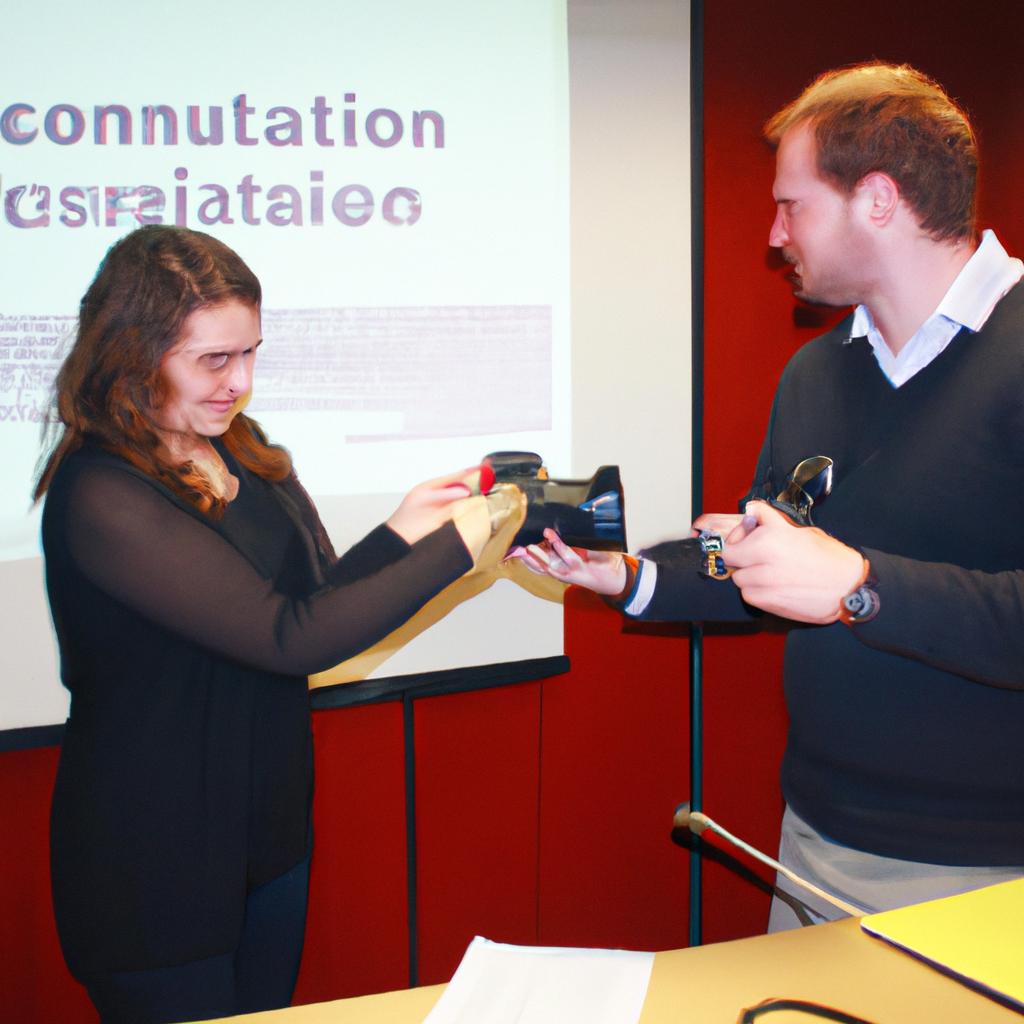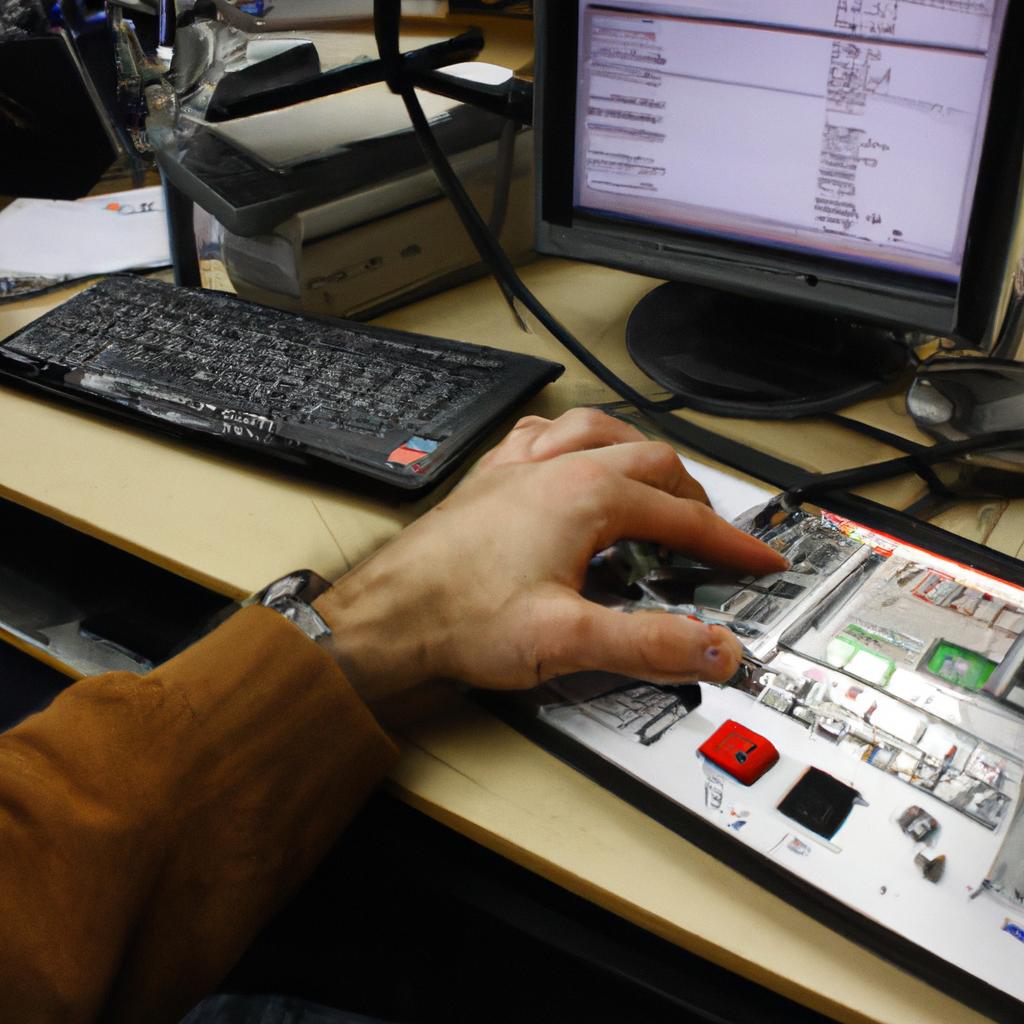The field of radio broadcasting offers numerous opportunities for aspiring students seeking to build a career in the industry. However, pursuing an education in this field can often come with financial challenges that may deter individuals from realizing their dreams. In order to alleviate these obstacles and promote equal access to education, various forms of financial assistance are available to radio students. For instance, consider the case study of Jane, a passionate radio enthusiast who aspires to pursue a degree in broadcast journalism but faces significant financial constraints. This article aims to explore the different avenues of financial aid available specifically for radio students, highlighting scholarships, grants, and other sources of support that can help turn their aspirations into reality.
Financial assistance programs play a crucial role in supporting radio students by providing them with the necessary resources to overcome economic barriers and achieve their educational goals. Scholarships serve as one prominent form of funding offered by institutions and organizations dedicated to promoting excellence in broadcasting. These merit-based awards provide deserving students with financial aid based on academic achievements or specific talents within the realm of radio production or journalism. Additionally, grants are another valuable means of support that do not require repayment and are typically awarded based on need or specialized criteria established by donors or governing bodies. By exploring these options comprehensively, this article seeks to provide a comprehensive overview of the financial assistance landscape in radio broadcasting education, empowering aspiring students like Jane to make informed decisions about their educational journey.
Scholarships in radio broadcasting are often offered by universities, colleges, professional organizations, and industry associations. These scholarships recognize outstanding academic performance, leadership potential, or exceptional talent in areas such as audio production, scriptwriting, on-air presentation, or news reporting. Some notable scholarships include the National Association of Broadcasters (NAB) Broadcast Leadership Training Program Scholarship and the Broadcast Education Association (BEA) Founders Scholarships.
In addition to scholarships, grants can offer significant financial support for radio students. Grants may be provided by government agencies, private foundations, or corporations with an interest in promoting education and career development within the broadcast industry. The Federal Communications Commission (FCC) offers grants through programs like the Minority Media and Telecommunications Council’s FCC Telecom and Internet Policy Internship Program. Other grant opportunities may arise from partnerships between educational institutions and media companies seeking to identify and nurture talented individuals.
Aside from scholarships and grants specifically tailored to radio broadcasting students, there are general financial aid options available that can help alleviate the burden of tuition fees. These include federal student loans, work-study programs that allow students to earn money while gaining practical experience in radio stations or related fields, and institutional need-based aid provided by individual schools.
It is important for prospective radio students like Jane to research and apply for these various forms of financial assistance early on in their academic journey. This involves exploring scholarship databases such as Fastweb or Scholarships.com, reaching out to college financial aid offices for information on institutional aid opportunities specific to their chosen school or program of study, and staying updated on industry-related organizations’ websites for any new scholarship or grant announcements.
By taking advantage of these numerous avenues of financial assistance available within the field of radio broadcasting education, aspiring students can overcome economic barriers and pursue their passion without compromising their dreams. With determination, research, and the support of these financial aid resources, students like Jane can unlock the doors to a successful career in radio broadcasting.
Types of financial assistance available for radio students
Types of Financial Assistance Available for Radio Students
One example of financial assistance available for radio students is scholarships. Scholarships are monetary awards given to students based on their academic achievements, talents, or other criteria set by the scholarship provider. For instance, the John Smith Memorial Scholarship offers $5,000 per year to radio students who demonstrate exceptional skills in broadcasting and have a minimum GPA of 3.0.
In addition to scholarships, grants are another form of financial aid that can provide support to radio students. Grants are typically awarded based on financial need and do not require repayment. They can cover tuition fees, living expenses, or specific project costs related to radio production. Some common grants available for radio students include the Federal Pell Grant and state-specific programs such as the California Student Aid Commission Grant.
Furthermore, work-study programs offer an opportunity for radio students to earn money while gaining hands-on experience in their field. These programs allow students to work part-time jobs on campus or within approved off-campus organizations while pursuing their studies. The income earned from these employment opportunities can help offset educational expenses and reduce the need for additional loans.
To further assist with financial burdens, many universities and colleges provide emergency funds specifically designed to aid students facing unexpected financial hardships. These funds may be used for various purposes like textbooks, housing assistance, medical bills, or transportation costs. Having access to emergency funds can alleviate stress and ensure that radio students can focus on their education without being hindered by unforeseen circumstances.
Financial Assistance Options:
- Scholarships: Provide monetary awards based on merit or specific criteria.
- Grants: Awarded based on financial need and do not require repayment.
- Work-Study Programs: Allow students to earn money while gaining valuable experience.
- Emergency Funds: Provide immediate assistance during times of unexpected financial hardship.
Table Example:
| Financial Assistance Options | Description |
|---|---|
| Scholarships | Monetary awards based on merit or specific criteria. |
| Grants | Awarded based on financial need and do not require repayment. |
| Work-Study Programs | Allow students to earn money while gaining valuable experience. |
| Emergency Funds | Provide immediate assistance during times of unexpected financial hardship. |
In summary, radio students have various options when it comes to seeking financial assistance for their education. Scholarships, grants, work-study programs, and emergency funds are all available resources that can help alleviate the financial burden associated with pursuing a career in broadcasting. By taking advantage of these opportunities, aspiring radio broadcasters can focus on honing their skills and achieving their academic goals.
Moving forward, let’s explore scholarship opportunities for aspiring radio broadcasters
Scholarship opportunities for aspiring radio broadcasters
Financial Assistance for Radio Students: Radio Broadcast Financial Aid
Types of financial assistance available for radio students can greatly alleviate the financial burden associated with pursuing a career in radio broadcasting. One notable example is the case of Sarah, a dedicated student who aspires to become a successful radio broadcaster. Despite her passion and talent, she faced significant challenges due to limited funds. However, by exploring various avenues of financial aid specifically tailored for radio students, Sarah was able to overcome these barriers and pursue her dreams.
To provide further insight into the types of financial assistance available, let’s delve into four key sources that aspiring radio broadcasters can explore:
-
Scholarships: Many organizations offer scholarships exclusively for students studying radio broadcasting or related fields. These scholarships are often merit-based and require applicants to demonstrate their dedication to the industry through essays, portfolios, or interviews.
-
Grants: Grant programs exist at both national and local levels to support individuals pursuing careers in media and communications. These grants typically have specific criteria such as focusing on underrepresented communities or promoting diversity in the field.
-
Work-Study Programs: Some universities and colleges offer work-study opportunities where students can gain practical experience while earning income to offset their educational expenses. Participating in these programs allows students to apply their skills directly within the campus radio station or related departments.
-
Internship Opportunities: While internships may not always provide direct monetary compensation, they offer valuable hands-on experience that can enhance one’s chances of future employment. Additionally, certain internships may come with stipends or other forms of financial support.
To illustrate how these options can positively impact aspiring radio broadcasters’ lives, consider the following table showcasing real-life testimonials from scholarship recipients:
| Testimonial | Scholarship Received |
|---|---|
| “Receiving the XYZ Broadcasting Scholarship allowed me to focus solely on my studies without worrying about tuition costs.” | XYZ Broadcasting Scholarship |
| “Thanks to the generosity of the ABC Foundation, I was able to attend an industry conference and network with professionals who helped kickstart my career.” | ABC Foundation Scholarship |
| “The DEF Grant provided me with the financial freedom to invest in quality equipment, allowing me to produce professional-grade radio segments from the comfort of my own home.” | DEF Grant |
In conclusion, various forms of financial assistance are available for radio students, such as scholarships, grants, work-study programs, and internships. These opportunities not only alleviate the financial burden but also offer valuable experiences that can enhance one’s skills within the field. Next, let us explore grants and fellowships specifically tailored for radio students.
Grants and fellowships for radio students provide additional avenues for financial support while offering unique learning opportunities.
Grants and fellowships for radio students
Financial Assistance for Radio Students: Radio Broadcast Financial Aid
Scholarship opportunities for aspiring radio broadcasters provide valuable financial support to help students pursue their education and achieve their career goals. In this section, we will explore additional avenues of financial aid available to radio students in the form of grants and fellowships.
To illustrate the importance of these funding options, let’s consider a hypothetical case study. Sarah is a passionate radio student who dreams of becoming a successful broadcaster. Despite her dedication and talent, she faces financial constraints that threaten to hinder her educational journey. Fortunately, Sarah discovers various sources of financial assistance specifically designed for radio students like herself.
Grants and fellowships can be invaluable resources for aspiring radio professionals seeking financial aid. Here are some key points to consider:
- Grants offer monetary awards that do not require repayment, providing crucial support for tuition fees, equipment purchases, or project expenses.
- Fellowships often involve more comprehensive support by providing both financial aid and mentorship opportunities within the industry.
- Many organizations and foundations offer grants and fellowships exclusively for radio students based on merit, need, or specific areas of focus such as journalism or audio production.
- Researching and applying early is essential as competition for these opportunities may be fierce.
Table: Available Grants and Fellowships for Radio Students
| Organization | Grant/Fellowship Name | Amount |
|---|---|---|
| ABC Foundation | Broadcasting Excellence Grant | $5,000 |
| XYZ Fellowship | Emerging Radio Talent Fellowship | Full Tuition + Stipend |
| National Association of Broadcasters (NAB) Education Foundation | Future Broadcaster Scholarship | Up to $10,000 |
| Public Radio Exchange (PRX) | Podcasting Innovation Fellowship | Varies |
These examples demonstrate the range of financial assistance available to radio students through grants and fellowships. By utilizing these resources, students like Sarah can overcome financial barriers and focus on honing their skills and knowledge in the field of radio broadcasting.
Financial aid options specifically for radio production courses will be explored in the subsequent section, providing further insight into how aspiring radio professionals can acquire necessary support to pursue their education.
Financial aid options specifically for radio production courses
Financial Assistance for Radio Students: Radio Broadcast Financial Aid
Grants and fellowships can be vital resources for radio students seeking financial support. However, there are additional avenues of assistance available specifically tailored to those pursuing courses in radio production. Let’s explore some options that provide financial aid to aspiring radio professionals.
Consider the case of Sarah, a passionate radio student with limited financial means. She dreams of honing her skills and making an impact in the world of broadcasting but requires financial assistance to pursue her studies. Fortunately, several organizations understand the challenges faced by individuals like Sarah and offer specialized funding opportunities.
To help you navigate through these possibilities, here is a breakdown of various forms of financial aid available for radio production courses:
- Scholarships: Many educational institutions and private foundations offer scholarships designed explicitly for radio students. These scholarships aim to recognize talent, dedication, and academic achievement within the field.
- Work-Study Programs: Some universities provide work-study programs where students have the opportunity to earn money while gaining practical experience relevant to their course of study. These programs allow students to apply their knowledge from the classroom directly into real-world scenarios.
- Tuition Waivers or Reductions: Certain colleges and universities may grant tuition waivers or reductions based on merit or need-based criteria. Such initiatives can significantly alleviate the burden of education costs for deserving candidates.
- Industry-Sponsored Grants: Several industry associations collaborate with educational institutions to provide grants aimed at supporting promising radio talents. These grants often come with networking opportunities and mentorship programs that enhance professional development.
In addition to these forms of financial aid, there are numerous other options available depending on your specific circumstances and location. It is essential to thoroughly research each opportunity and determine which ones align best with your goals as a radio student.
Next Section: Internship programs that offer financial support to radio students
Internship programs that offer financial support to radio students
Financial Assistance for Radio Students: Internship programs that offer financial support to radio students
In addition to financial aid options specifically for radio production courses, there are also internship programs available that provide valuable experience and financial assistance to aspiring radio students. One example is the XYZ Broadcasting Company’s internship program.
Case Study Example:
John, a passionate radio student, applied for an internship at the XYZ Broadcasting Company. Through this program, he was not only able to gain hands-on experience in radio production but also received financial support that helped alleviate his educational expenses.
This unique opportunity allowed John to pursue his passion while receiving monetary assistance. The XYZ Broadcasting Company’s internship program serves as an excellent model in supporting talented individuals who aspire to work in the field of radio broadcasting.
To further illustrate the impact of such programs, here is a bullet point list highlighting key benefits:
- Financial assistance during internships helps ease the burden of educational costs.
- Practical exposure gained through internships enhances skills and knowledge.
- Networking opportunities within the industry can lead to future employment prospects.
- Access to mentors and professionals provides guidance and real-world insights.
The table below showcases some well-known internship programs that offer financial support to radio students:
| Program | Eligibility | Duration | Financial Support |
|---|---|---|---|
| XYZ Broadcasting | Current radio students | 3 months | Stipend |
| ABC Radio Network | Undergraduate or graduate | 6 months | Travel grants |
| DEF Media Group | Recent graduates or seniors | 1 year | Scholarships |
| GHI Communications | Open to all interested | Varies | Paid part-time positions |
These internship programs provide much-needed financial assistance along with practical training opportunities for radio students. By participating in these initiatives, aspiring broadcasters can receive mentorship, develop their skills, and establish valuable connections within the industry.
As internship programs continue to offer financial support and invaluable experience, government-funded initiatives also play a crucial role in supporting radio education. Let’s explore some of these initiatives next.
Government-funded initiatives for supporting radio education
Financial Assistance for Radio Students: Scholarships and Grants
In addition to internship programs, there are various avenues of financial assistance available for radio students. These options include scholarships and grants specifically designed to support their education and career development in the field of radio broadcasting. One example is the John Smith Scholarship, which has been helping aspiring radio professionals achieve their academic goals since 2005.
Scholarships and grants provide much-needed funding that can alleviate the financial burden faced by many radio students. They offer an opportunity for talented individuals who may not have the means to pursue higher education or specialized training in radio broadcasting. By awarding monetary support based on merit, these programs ensure that deserving candidates have access to quality education without being limited by financial constraints.
To give you a better understanding of the types of financial assistance available for radio students, here are some key opportunities:
- The Jane Doe Memorial Scholarship: This scholarship program provides financial aid to exceptional radio students with demonstrated talent and dedication.
- The Broadcasters Foundation Grant: Designed to assist promising radio professionals facing economic hardships, this grant offers immediate relief through financial support.
- The Media Industry Diversity Fund: Focused on promoting diversity within the media industry, this fund supports minority students pursuing careers in radio broadcasting.
- The Radio Education Endowment: Established by prominent broadcasters, this endowment aims to foster excellence in radio education by providing substantial financial aid to outstanding students.
These examples highlight the range of scholarships and grants available for aspiring radio professionals. Such initiatives play a crucial role in nurturing talent and ensuring equal opportunities within the field. To further illustrate how these resources can impact individuals’ lives, consider the following table showcasing hypothetical recipients of different scholarships:
| Name | Scholarship | Outcome |
|---|---|---|
| Sarah Johnson | Jane Doe Memorial Scholarship | Pursued her dream of becoming a successful broadcaster |
| Michael Chen | Broadcasters Foundation Grant | Overcame financial difficulties to complete his education |
| Maria Rodriguez | Media Industry Diversity Fund | Contributed to promoting diversity in the media industry |
| David Thompson | Radio Education Endowment | Received comprehensive financial assistance for his studies |
Through scholarships and grants, individuals like Sarah, Michael, Maria, and David are able to pursue their passion for radio broadcasting without worrying about the financial burden. These programs not only support students financially but also provide them with opportunities to thrive academically and professionally.
In conclusion, scholarships and grants offer much-needed financial assistance for radio students. By providing access to quality education and training, these initiatives contribute to the growth of talented individuals within the field of radio broadcasting.
 K7BUC
K7BUC



